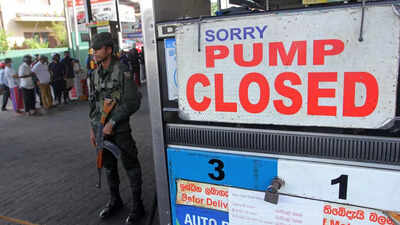Top Searches
- News
- World News
- South Asia News
- Just days from running out of fuel, Sri Lanka halts sales for 2 weeks
Just days from running out of fuel, Sri Lanka halts sales for 2 weeks

SL power co seeks 835% price rise (AFP)
COLOMBO: Sri Lanka will shut schools and only allow fuel supplies to services deemed essential like health, trains and buses for two weeks starting Tuesday in a desperate attempt to deal with a severe shortage. "From midnight today, no fuel will be sold except for essential services like the health sector, because we want to conserve the little reserves we have," government spokesman Bandula Gunawardana said. Industries like garments, a big dollar earner, are left with fuel for only about a week to 10 days. Current stocks of the country will exhaust in just under a week based on regular demand, Reuters calculations show.
Sri Lanka will issue fuel only to trains and buses, medical services and vehicles that transport food starting Tuesday until July 10, Gunewardena said. Schools in urban areas will be shut and everyone is urged to work from home, he said. The government fuel stockpile stands at about 9,000 tonnes of diesel and 6,000 tonnes of petrol, the power minister said on Sunday.
Sri Lanka's power regulator said the country was using its last stocks of furnace oil to run multiple thermal power plants and keep power cuts to a minimum. Scheduled power cuts will rise to three hours from Monday from two and a half hours earlier.
Meanwhile, a delegation from the US treasury and the state department opened talks with PM Ranil Wickremesinghe. "The US has agreed to provide technical assistance for fiscal management," the premier's office said.
SL power co seeks 835% price rise
Sri Lanka's heavily loss- making state-run electricity monopoly asked for a shocking price rise of over 800% for its poorest customers with the bankrupt nation out of fuel, regulators said on Monday. The Ceylon Electricity Board lost 65 billion rupees ($185 million) in the first quarter and sought an 835% price hike for the heavily-subsided smallest power consumers, the Public Utilities Commission of Sri Lanka said. Currently, anyone using less than 30KW a month pays a flat 54 rupees, which the CEB sought to raise to 507 rupees. "We proposed a direct subsidy from the treasury to keep the increase to less than half of what they have asked," PUCSL head Janaka Ratnayake said.
Sri Lanka will issue fuel only to trains and buses, medical services and vehicles that transport food starting Tuesday until July 10, Gunewardena said. Schools in urban areas will be shut and everyone is urged to work from home, he said. The government fuel stockpile stands at about 9,000 tonnes of diesel and 6,000 tonnes of petrol, the power minister said on Sunday.
Sri Lanka's power regulator said the country was using its last stocks of furnace oil to run multiple thermal power plants and keep power cuts to a minimum. Scheduled power cuts will rise to three hours from Monday from two and a half hours earlier.
Meanwhile, a delegation from the US treasury and the state department opened talks with PM Ranil Wickremesinghe. "The US has agreed to provide technical assistance for fiscal management," the premier's office said.
SL power co seeks 835% price rise
Sri Lanka's heavily loss- making state-run electricity monopoly asked for a shocking price rise of over 800% for its poorest customers with the bankrupt nation out of fuel, regulators said on Monday. The Ceylon Electricity Board lost 65 billion rupees ($185 million) in the first quarter and sought an 835% price hike for the heavily-subsided smallest power consumers, the Public Utilities Commission of Sri Lanka said. Currently, anyone using less than 30KW a month pays a flat 54 rupees, which the CEB sought to raise to 507 rupees. "We proposed a direct subsidy from the treasury to keep the increase to less than half of what they have asked," PUCSL head Janaka Ratnayake said.
FOLLOW US ON SOCIAL MEDIA
FacebookTwitterInstagramKOO APPYOUTUBE

Start a Conversation
end of article









